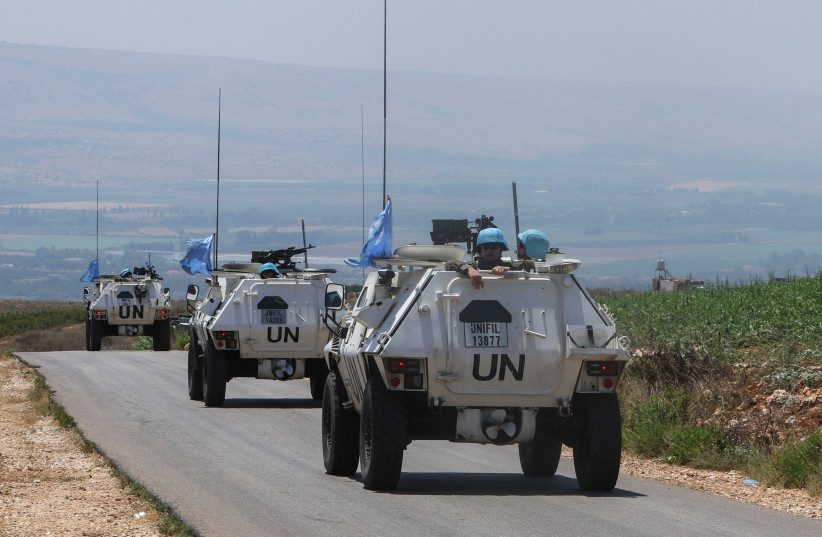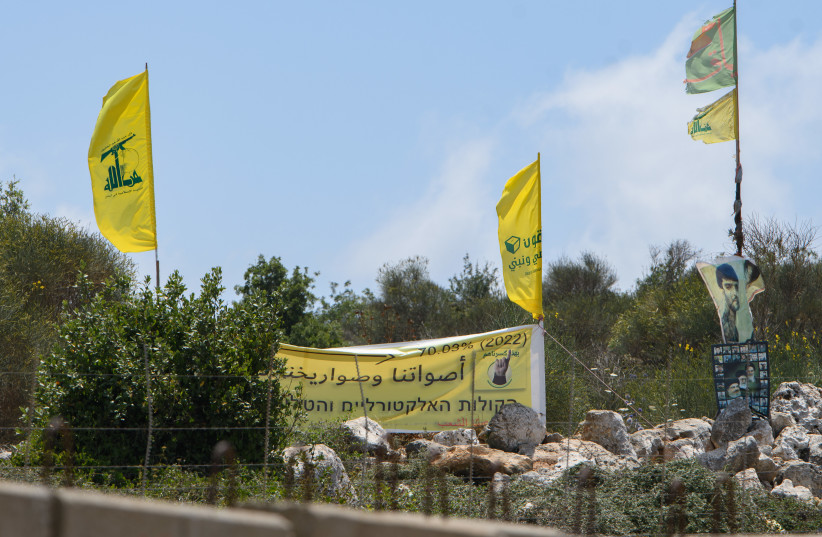Are the Hezbollah border threats the new normal for Israel? – analysis
Over the last several months Hezbollah has established a new normal of provocations in Lebanon.
This threatens Israel and it appears that the incidents continue to increase in both tempo and type.
The Israeli Defense Forces said on Saturday that “IDF soldiers fired warning shots and used riot dispersal means in order to distance a number of suspects who crossed the Blue Line in the area of Mount Dov, after they refused to withdraw from the area. The suspects returned to Lebanese territory.”
Al-Mayadeen, the pro-Iran media outlet, claimed that on Saturday “a media delegation was on a tour with Qassem Hashem, a member of the Development and Liberation Bloc in the Lebanese Parliament, on the outskirts of the Shebaa Farms.”
The “Shebaa Farms” is another name for the Mount Dov area. Another article from the media outlet says that the current tensions could lead to a “military confrontation” lasting “several days.”
 UN peacekeepers (UNIFIL) vehicles drive in the Lebanese village of Wazzani near the border with Israel, southern Lebanon, July 6, 2023. (credit: AZIZ TAHER/REUTERS)
UN peacekeepers (UNIFIL) vehicles drive in the Lebanese village of Wazzani near the border with Israel, southern Lebanon, July 6, 2023. (credit: AZIZ TAHER/REUTERS)The article, which poses as an analysis, basically says that even if neither side desires conflict, tensions are growing. The important issue then is examining how Hezbollah has begun to dictate the tempo and pressure on the border.
This now appears to be the new normal or at least an attempt by Hezbollah to create one.
Changing up the border rules
LAST WEEK it became clear that Hezbollah was trying to change the rules on the border. In addition, a speech by Hezbollah leader Hassan Nasrallah revealed how the terror group is throwing down a rhetorical gauntlet over some tents it has set up. The tents were an attempt to move a pawn into Mount Dov to try to trade area for demands regarding Ghajar, a village on the border that recently opened to tourism.
But there is more to it than just this. Hezbollah is learning from the maritime deal last year that it can create artificial tensions to then exploit the crisis and make gains. This gives it additional influence over the Lebanese government to make demands on Israel.
It also creates fake crises to profit from. It also is able to draw in the US and thus gain a kind of legitimacy through its actions. No other terror group could do what Hezbollah does. For instance, no one would let terror groups invade a border area and demand concessions and get the government (i.e Lebanon) to rubber stamp them.
Let’s review what is known. This past week Hezbollah enabled an attempt to damage the security fence. While Hezbollah may not always take credit for these activities, the group controls southern Lebanon and therefore it may use plausible deniability to avoid being held to account for its actions.
In this case, several suspects approached the security fence with Lebanon and attempted to sabotage it, the IDF said at the time. The identity of the suspects is not known but this is a serious incident.
 Hezbollah flags on the border between Israel and Lebanon, northern Israel, July 03, 2022. (credit: AYAL MARGOLIN/FLASH90)
Hezbollah flags on the border between Israel and Lebanon, northern Israel, July 03, 2022. (credit: AYAL MARGOLIN/FLASH90)Then on July 6, there was a launch of an anti-tank missile in Lebanon and shrapnel was located adjacent to the town of Ghajar. On April 6 Hamas fired 34 rockets from Lebanon at Israel. In addition, in April mortars were also launched near Metulla.
The IDF struck targets belonging to the Hamas terror organization in southern Lebanon in April. In March a man infiltrated from Lebanon into Israel and set up an explosive at a junction near Megiddo. He was later neutralized. Back in February, there was also a drug smuggling attempt into Israeli territory near the town of Arab al-Aramshe.
In addition to all these incidents are the Hezbollah tents quietly set up in the disputed territory of Mount Dov.
Earlier this month the Institute for National Security Studies correctly noted that “Israel must use every possible means to remove the Hezbollah tents at Har Dov. The political process should be fully exhausted, but limited in time. If it fails, Israel should take action to remove the tents, even at the price of risking a deterioration into a limited conflict on the ground.”
The overall context now reveals how Hezbollah has been ratcheting up the tensions slowly, applying more pressure over time, and testing the limits to which its behavior can stretch.
It continues to up the ante, including with the tents, the demands about Ghajar, and now border incidents including damage to the fence, the firing of the anti-tank missile, and the enabling of rocket fire.





Comments are closed.